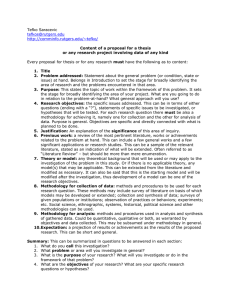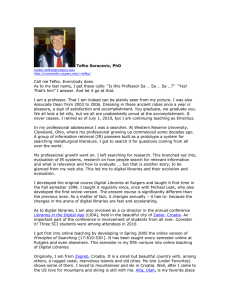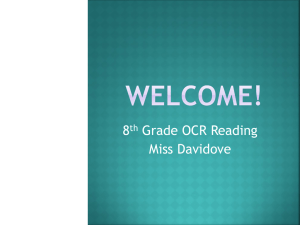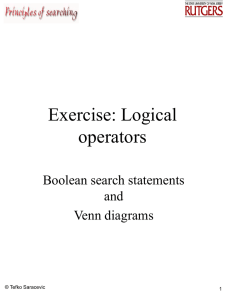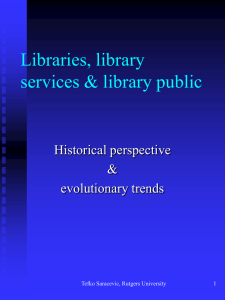530-03_opening.ppt
advertisement
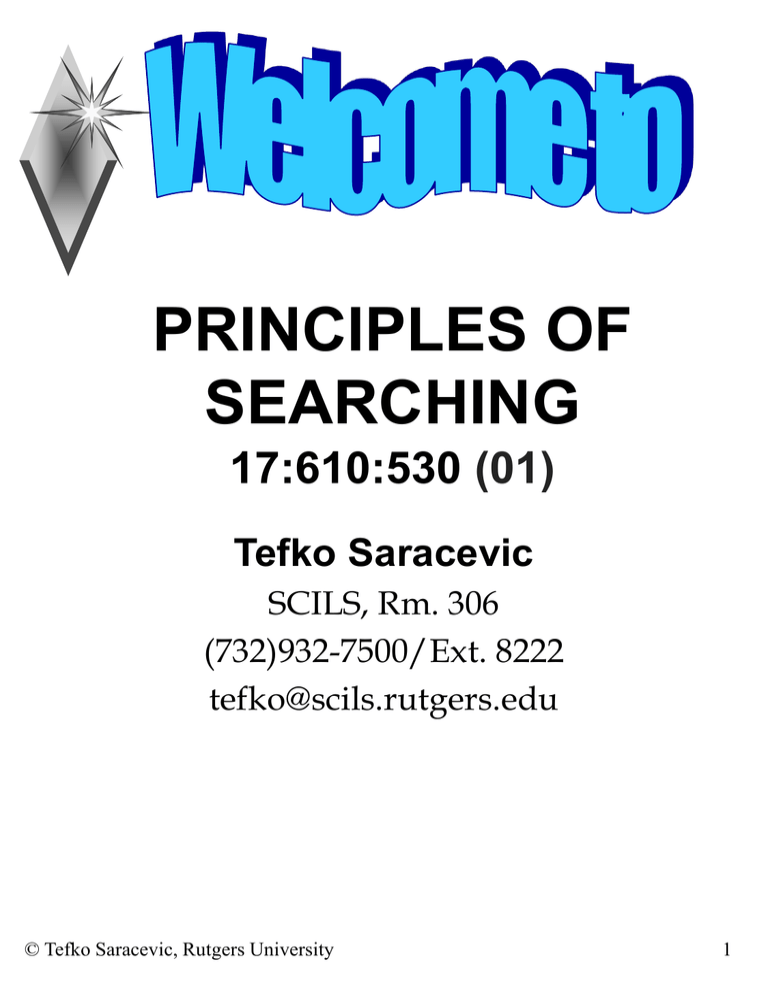
PRINCIPLES OF SEARCHING 17:610:530 (01) Tefko Saracevic SCILS, Rm. 306 (732)932-7500/Ext. 8222 tefko@scils.rutgers.edu © Tefko Saracevic, Rutgers University 1 Communication Course web site: Course listserve lis530_01@rams.rutgers.edu http://www.scils.rutgers.edu/~tefko/Cours es/530 posted will be exercises, lecture slides, tutorials, information etc. download, copy print … RAMS = Rutgers Automated Mail Service documentation at http://rams.rutgers.edu/docs.html you are automatically subscribed from registrar record used to email messages to the whole class – the list is open, everybody can email © Tefko Saracevic, Rutgers University 2 Your record RAMS gets the email account from your record Every student must have an email account recorded at the registrar Update your record at: http://www.acs.rutgers.edu/ directory scroll down till you get to record update for students © Tefko Saracevic, Rutgers University 3 Your accounts Rutgers University Library get a barcode and pin follow instructions at http://www.libraries.rutgers.edu under How do I…? DIALOG: user name: will get a number from class list password: scils LexisNexis user name:will get an ID from Nexis password: your last name © Tefko Saracevic, Rutgers University 4 Student groups Form groups of four colleagues) each group will have a number work out a method for communication, exchanges Groups will work together in the lab & should cooperate as to exercises A group will present exercise & other results together Pick up missed instructions, assignments from the group © Tefko Saracevic, Rutgers University 5 Course objectives Integrated understanding of: Content: content structure of information resources - databases, Web, reference - as they affect searching Systems: Models of information retrieval (IR) systems, Web search engines, & reference services Human-human interaction: User information seeking as the context for searching; mediation & interviewing Human-computer interaction: Principles for effective searching & variations in search strategies & tactics Results: Alternatives in presentation of results to users; evaluation of results © Tefko Saracevic, Rutgers University 6 In order to search you need an understanding of: Content: What is in the sources? How is it organized? Systems: Where? What kinds? IR, Web, References ... Human-human interaction: How? You and the user Human-computer interaction: How? You and the computer Results: What & how to present; evaluate © Tefko Saracevic, Rutgers University 7 Symbolically ... Content System HHI HCI Results © Tefko Saracevic, Rutgers University ? 8 What will the course NOT do? Create professional searchers out of you Make you an expert on databases, systems, Web engines © Tefko Saracevic, Rutgers University 9 What will the course DO? Provide you with a practical & theoretical foundation and framework on basis of which you can then: develop into a professional searcher or technical assistant to users grow & evolve with the field adjust to inevitable changes in the world of searching eventually, depending on your other courses & life-long learning, become an expert © Tefko Saracevic, Rutgers University 10 Mix The course is a mix of theory experimentation practice Why theory? Base for further understanding & professional development nothing more practical than a good theory © Tefko Saracevic, Rutgers University 11 Topics covered 1. Overview Theme A: Structure of content 2. Databases; structure of records 3. Structure of indexes; vocabularies Theme B: Systems for searching 4. IR models; Boolean & ranking 5. Web search engines. Reference Theme C: Human-human interaction 6. Information seeking by users 7. Intermediaries; mediation © Tefko Saracevic, Rutgers University 12 Topics (cont.) Theme D: Human-computer interaction 8. Interfaces; navigation, browsing 9. Effective search strategies & tactics Theme E: Results 10. Presentation & display of results 11. Evaluation results & projects © Tefko Saracevic, Rutgers University 13 Course structure 1. Lectures 2. Required readings (book bibliography & reserve on RUL) with Summaries - per schedule (50% of grade) 3. Laboratory exercises 4. Discussion 5. Term project (50% of grade) © Tefko Saracevic, Rutgers University 14 Summaries Brief critical review Relate to (points added for this): relevant personal, professional experiences with library & information services; examples translation/implication for practice questions for discussion, and/or other readings, topics, courses, project, exercise Follow APA format MUST have prescribed heading (points deducted if not) © Tefko Saracevic, Rutgers University 15 Laboratory exercises Using DIALOG, Lexis-Nexis, Web search engines Search for answers for given questions Use a variety of tactics & features Homework exercises as per schedule Work cooperatively in groups © Tefko Saracevic, Rutgers University 16 Term project Select a specific user with an inf. need to do an online search Interview the user (if necessary several times) Construct a user model Select databases for searching Construct search strategies & conduct searching - reiterate Organize results for presentation Present results to user; evaluate Write a technical report © Tefko Saracevic, Rutgers University 17 Technical report Selection of user: who? User question & model what task? how much knows? what topics? terminology? priorities? Mode & results of interviews Summary of search tactics & approaches, dynamics Changes in user model, user definition of problem Changes in searching & you Evaluation -what does or does not work? What effects of decisions? What would you do differently? © Tefko Saracevic, Rutgers University 18 Exercises 1 & 2 DIALOG tutorials LEARN & PRACTICE: Contents of databases Structure of databases & records - BLUE SHEETS Basic search commands Basic output commands Logical operators, execution Truncation Searching in fields DIALINDEX; OneSearch © Tefko Saracevic, Rutgers University 19 © Tefko Saracevic, Rutgers University 20
